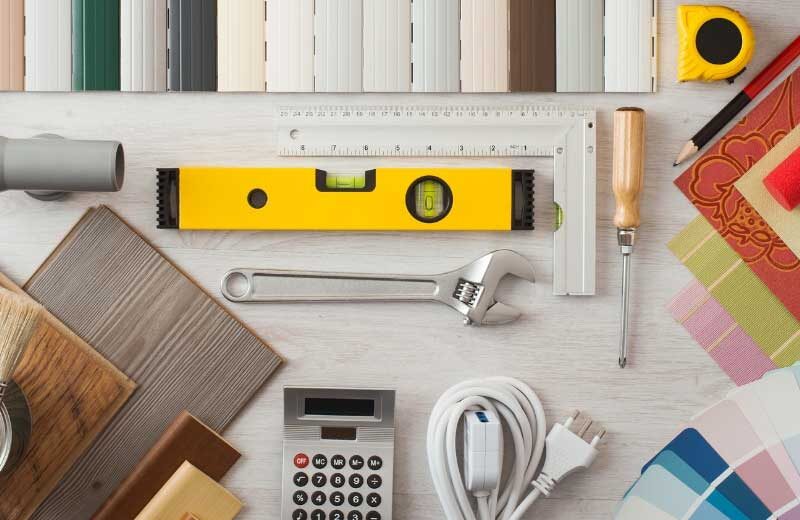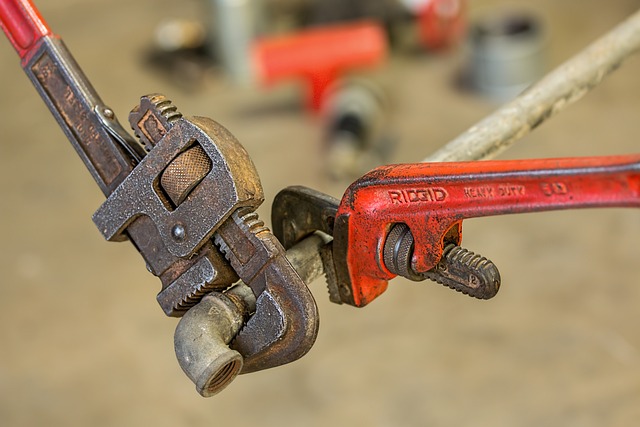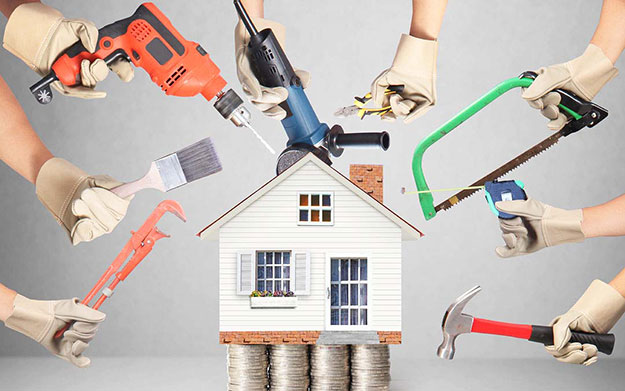
Welcome to the DIY Revolution: Top 10 Home Improvement Tips for Beginners!
In this article, we will provide you with expert advice and essential insights to help you embark on your journey of transforming your living space.
Whether you are a novice or have some prior experience, these tips will equip you with the knowledge and skills necessary to tackle home improvement projects with confidence.
Get ready to unleash your creativity and achieve the freedom to shape your surroundings according to your vision.
Safety First
The first step in any home improvement project is ensuring the safety of yourself and others involved. It is crucial to take safety precautions to prevent accidents and injuries. One of the most common newbie mistakes is underestimating the importance of safety measures.
Before starting any project, make sure to wear appropriate safety gear, such as goggles, gloves, and a hard hat if necessary. Familiarize yourself with the tools and equipment you will be using, and always follow the manufacturer's instructions.
Keep your work area clean and organized to avoid tripping hazards. Additionally, it is essential to turn off the power supply when working with electrical components.

Taking these safety precautions will help you complete your home improvement projects safely and efficiently.
Measure Twice Cut Once
To ensure accurate and precise cuts in your home improvement projects, it is imperative to adopt the mantra of 'measure twice, cut once.' This simple phrase reminds us to take the time to double-check our measurements before making any cuts, saving us from costly mistakes and wasted materials.
Here are three key tips for mastering the art of measuring and cutting:
- Invest in quality measuring tools: A reliable tape measure, a combination square, and a speed square are essential for accurate measurements. Don't settle for cheap alternatives that may compromise your precision.
- Understand different cutting techniques: Whether you're using a saw, a utility knife, or a pair of scissors, knowing the proper cutting techniques is crucial. Take the time to learn and practice different methods to achieve clean and precise cuts.
- Take your time: Rushing through measurements and cuts can lead to costly errors. Slow down, focus, and give yourself enough time to get it right. Remember, precision is key.
Budget Ahead
When considering embarking on a DIY home improvement project, it is essential to carefully plan and budget ahead to ensure a smooth and successful renovation. Budget planning is crucial to avoid overspending and to prioritize expenses effectively.
Start by determining your overall budget and then break it down into specific categories such as materials, tools, and labor costs if needed. Research and compare prices to find cost-effective solutions that fit within your budget. Consider alternative options, such as shopping at thrift stores or repurposing items, to save money without compromising quality.
Additionally, it is wise to set aside a contingency fund for unexpected expenses that may arise during the project. By budgeting ahead, you can confidently tackle your DIY project and achieve the desired results without breaking the bank.
Know When to Hire a Pro
Sometimes, it is necessary to enlist the expertise of a professional. While DIY projects can save you money and provide a sense of accomplishment, there are certain tasks that should be left to the experts. Here are three instances when hiring a pro is the best course of action:

- Structural Changes: When it comes to major renovations or alterations that involve the structural integrity of your home, it is crucial to consult a professional. They have the knowledge and experience to ensure that the work is done safely and up to code.
- Electrical Work: Working with electricity is dangerous and requires specialized skills. A licensed electrician can handle complex wiring, installations, and repairs, ensuring your safety and preventing potential hazards.
- Plumbing Issues: Plumbing problems can quickly escalate if not addressed properly. A professional plumber has the expertise to diagnose and fix issues efficiently, saving you from potential water damage and expensive repairs down the line.
Using quality tools is essential for successful home improvement projects. When it comes to tackling DIY projects, investing in durable equipment is crucial. By using reliable tools, you can ensure that your work is done efficiently and with precision.
High-quality tools not only provide better results but also make the entire process easier and more enjoyable. When considering which tools to purchase, it's important to invest wisely. Look for reputable brands known for their durability and performance. While quality tools may come with a higher price tag, they will ultimately save you money in the long run by lasting longer and delivering better results.
Plan Projects in Advance
Planning projects in advance is a crucial step in achieving successful home improvement. By taking the time to carefully plan out your projects, you can reap numerous benefits such as avoiding costly mistakes, saving time, and ensuring that you have all the necessary materials and tools before you begin.
Pre-planning allows you to visualize the end result, create a realistic timeline, and strategize efficient ways to complete the tasks at hand.
Benefits of Pre-Planning
To ensure a successful home improvement project, it is crucial to pre-plan and carefully consider the various aspects involved. This process of pre-planning offers several benefits that can save you time, money, and frustration in the long run.
Here are three key advantages of pre-planning for your home improvement projects:
- Avoid Costly Mistakes: Pre-planning allows you to thoroughly evaluate your project, identify potential issues, and come up with effective solutions. By considering all the necessary steps and requirements beforehand, you can avoid costly mistakes that may arise from overlooking important details.
- Streamline the Process: Pre-planning helps you create a clear roadmap for your project, outlining each step and timeline. This allows you to streamline the process, ensuring that everything is well-organized and flows smoothly.
- Ensure Compliance: Pre-planning also highlights the importance of obtaining the necessary permits and complying with local regulations. By understanding the permit requirements in advance, you can avoid delays or fines that may arise from non-compliance.
Time-Saving Strategies
One effective strategy for saving time on your home improvement projects is to carefully plan them in advance. Time management is crucial when it comes to tackling any DIY project.

By taking the time to plan and organize your tasks, you can ensure that you make the most efficient use of your time. Start by creating a detailed list of all the tasks that need to be completed, along with their estimated timeframes.
Break down larger projects into smaller, manageable tasks and prioritize them based on importance and urgency. This will help you stay focused and avoid wasting time on unnecessary tasks. Additionally, consider using efficiency techniques such as batch processing similar tasks and utilizing tools and equipment that can help speed up the process.
Avoiding Costly Mistakes
Implementing a well-thought-out plan is essential in avoiding costly mistakes when undertaking home improvement projects. By taking the time to plan in advance, homeowners can ensure that their projects stay on track and within budget.
Here are three key steps to consider when creating a plan for your home improvement project:
- Research and gather information: Before starting any project, it is important to research and gather information about the specific task at hand. This will help you understand the scope of the project, identify potential pitfalls, and explore cost-effective solutions.
- Set a realistic budget: One of the biggest mistakes homeowners make is underestimating the cost of a project. By setting a realistic budget, you can avoid overspending and ensure that you have enough funds to complete the project successfully.
- Create a timeline: Time management is crucial in home improvement projects. By creating a timeline, you can set realistic deadlines for each stage of the project, ensuring that everything stays on track and avoiding unnecessary delays.
Get Necessary Permits
Before embarking on any home improvement project, it is crucial to understand the permit application process and the importance of obtaining the necessary permits.
Permits ensure that the project meets local building codes and safety regulations, protecting both the homeowner and the community.
Common permit requirements may include detailed project plans, inspections at various stages, and payment of fees.

Permit Application Process
To ensure compliance with regulations, it is imperative for homeowners to obtain the necessary permits before starting any home improvement project. The permit application process can sometimes be complex, so here are some tips to help you navigate through it:
- Understand local regulations: Each city or county may have different rules and regulations regarding permits. It is important to familiarize yourself with these regulations to avoid any penalties or delays in your project.
- Research permit requirements: Different types of projects may require different permits. Before applying, make sure you know what permits are needed for your specific project. This will help streamline the application process.
- Seek professional guidance if needed: If you are unsure about the permit application process, it is advisable to consult with professionals such as architects or contractors who have experience in dealing with permits. They can guide you through the process and ensure you meet all the necessary requirements.
Importance of Permits
Obtaining the necessary permits is crucial for homeowners to ensure compliance with regulations and proceed with their home improvement projects smoothly. Before you start any major renovation or construction work, it is important to understand the permit application process and the permit requirements in your area.
Permits are typically required for projects that involve structural changes, electrical or plumbing work, or modifications to the exterior of the property. These permits are issued by local government authorities to ensure that the work is carried out safely and meets building codes.
Applying for permits involves submitting detailed plans and specifications for the proposed project, along with any necessary fees. The permit application process may also include inspections at various stages of the project to ensure compliance with the approved plans.
By obtaining the necessary permits, homeowners can avoid costly fines and delays. It also provides legal protection and peace of mind, knowing that the project has been approved by the appropriate authorities.
Common Permit Requirements
Homeowners must ensure they obtain the necessary permits to comply with regulations and proceed smoothly with their home improvement projects. Here are three common permit requirements to keep in mind:
- Permit Application: Before starting any major home improvement project, homeowners should submit a permit application to the local building authority. This application typically includes detailed plans and specifications, as well as a fee.
- Permit Approval: Once the permit application is submitted, it undergoes a review process by the building authority. They will assess whether the proposed project complies with safety and zoning regulations. This approval process may take some time, so it's important to plan accordingly.
- Permit Display: After the permit is approved, homeowners must prominently display it at the project site. This ensures that inspectors can easily verify that the work is being done as per the approved plans.
Learn Basic Skills
As a beginner in home improvement, developing basic skills is crucial for successfully completing projects. Whether you're tackling small repairs or embarking on larger renovation endeavors, having a solid foundation of basic skills will not only save you time and money, but also give you the confidence to take on more challenging projects in the future.

Some key basic skills to learn include measuring and cutting accurately, using essential tools such as a drill or a hammer, and understanding basic plumbing and electrical concepts. Starting with beginner projects, like installing shelves or painting a room, can help you practice and refine these skills.
As you gain experience and knowledge, you'll be able to tackle more advanced projects and truly embrace the freedom of DIY home improvement.
Be Patient
When it comes to home improvement projects, patience is key. Giving yourself time to make mistakes and learn from them is crucial to your success.
Time for Mistakes
During the process of home improvement, it is crucial to allow sufficient time for mistakes to occur and to practice patience. This is because making mistakes is a common part of the learning curve when it comes to DIY projects. By giving yourself the freedom to make mistakes and learn from them, you can grow your skills and become a more confident and capable DIYer.
Here are three important reasons why allowing time for mistakes is essential:
- Learning opportunity: Mistakes provide valuable learning opportunities. They allow you to identify what went wrong, understand how to avoid similar mistakes in the future, and improve your skills.
- Problem-solving skills: Dealing with mistakes forces you to think creatively and develop problem-solving skills. It encourages you to find alternative solutions and overcome challenges.
- Building resilience: Making mistakes and learning from them builds resilience and perseverance. It teaches you to adapt, bounce back from setbacks, and continue with your home improvement projects.
Slow and Steady
How can beginners cultivate patience and maintain a steady pace during their home improvement projects?
One of the key factors in achieving success is to embrace the mantra of 'slow and steady.' It is important to understand that home improvement projects take time, and rushing through them can lead to costly mistakes.

By taking the time to plan, research, and execute each step of the project methodically, beginners can ensure a smoother and more satisfying outcome.
Patience is crucial when it comes to learning new skills and techniques, as it allows for a deeper understanding and mastery of the task at hand.
Embracing a slow and steady approach not only minimizes the risk of errors but also allows beginners to fully enjoy the process of transforming their living spaces.
Practice Makes Perfect
Beginners in home improvement should understand that practice is essential for achieving perfection and should embrace patience throughout their journey. Building confidence and mastering new skills takes time, but with dedication and perseverance, anyone can become proficient in DIY projects. Here are three practice techniques that can help beginners improve their skills:
- Start with simple projects: Begin with small, manageable tasks that allow you to practice basic techniques and build your confidence. This could include painting a room, installing shelves, or assembling furniture.
- Seek guidance and resources: Take advantage of online tutorials, instructional videos, and books that provide step-by-step instructions and tips. Joining DIY communities and forums can also provide valuable advice and support from experienced DIY enthusiasts.
- Repeat and refine: Repeat projects multiple times to gain familiarity and efficiency. As you become more comfortable, challenge yourself with more complex tasks, gradually expanding your skill set.
Clean as You Go
A key tip for beginners in home improvement is to consistently clean as you go, ensuring a neat and organized work environment throughout the project. Keeping your work area clean not only makes the job easier but also helps prevent accidents and injuries.
Here are a few cleaning tips and organization hacks to help you maintain a tidy workspace. First, invest in storage solutions such as bins, shelves, and pegboards to keep tools and materials organized and easily accessible.
Second, have a designated area for trash and recycling, making it easier to dispose of waste and keep your work area clutter-free.

Finally, wipe down surfaces regularly to remove dust and debris, preventing them from accumulating and making your workspace less efficient.
Frequently Asked Questions
What Are Some Common Safety Precautions to Keep in Mind While Working on Home Improvement Projects?
Safety precautions are important guidelines to keep in mind while working on home improvement projects. These measures ensure the well-being of individuals, prevent accidents, and minimize potential risks. Adhering to safety protocols is crucial for a successful and safe DIY experience.
How Can Beginners Accurately Measure Materials Before Cutting?
Accurate measurements are crucial for successful home improvement projects. Beginners can ensure precision by using a tape measure or ruler, marking measurements clearly, and employing cutting techniques such as straight edges or miter saws.
Are There Any Specific Budgeting Tips or Strategies for Home Improvement Projects?
Budgeting strategies and cost-saving tips are essential for successful home improvement projects. By carefully planning and researching materials, labor costs, and potential discounts, homeowners can ensure they stay within their budget while achieving their desired results.
What Are the Signs That Indicate It's Time to Hire a Professional for a Particular Task?
Recognizing the signs that indicate it's time to hire a professional for a particular task is crucial. Hiring experts brings numerous benefits, including their expertise, experience, and ability to handle complex issues efficiently, ensuring a successful outcome.
When it comes to DIY home improvement projects, it is essential to choose recommended brands or types of quality tools. By selecting the right tools, you can ensure efficient and successful completion of your projects.
 Family Craft ProjectsHome ImprovementCooking and BakingReuse and RecycleDIY GiftsEco-Friendly ProjectsDIY Home SolutionsSeasonal ActivitiesFun and GamesLearn TogetherPrivacy PolicyTerms And Conditions
Family Craft ProjectsHome ImprovementCooking and BakingReuse and RecycleDIY GiftsEco-Friendly ProjectsDIY Home SolutionsSeasonal ActivitiesFun and GamesLearn TogetherPrivacy PolicyTerms And Conditions

 Family Craft ProjectsHome ImprovementCooking and BakingReuse and RecycleDIY GiftsEco-Friendly ProjectsDIY Home SolutionsSeasonal ActivitiesFun and GamesLearn TogetherPrivacy PolicyTerms And Conditions
Family Craft ProjectsHome ImprovementCooking and BakingReuse and RecycleDIY GiftsEco-Friendly ProjectsDIY Home SolutionsSeasonal ActivitiesFun and GamesLearn TogetherPrivacy PolicyTerms And Conditions
